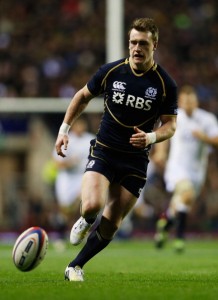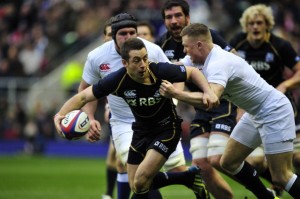
Blown away: Scotland are unable to stop Billy Twelvetrees scoring during England's 38-18 Calcutta Cup victory
By Alan Dymock
AFTER SCAMPERING backwards and forwards all afternoon, a red-faced and heavy-legged Matt Scott leant against the bar in the conference room and pronounced, “that was the hardest game of rugby I have ever played.”
He was not pronouncing this into a recording device, nor were there any vulture-like press folk prodding him to extol how much inner agony he was experiencing after losing a Calcutta Cup match at Twickenham, 38-18. He was simply involuntarily sighing into the room after a day of being pulverised.
Scotland had paid a dutiful homage to the Cup, tearing into action when England allowed them, and screaming after men in white whenever they knew embarrassment was a distinct possibility. They did not, in fact, embarrass themselves for one moment.
However, as Scott Johnson told the press pack afterwards, “if it looks like a pig, it’s a pig.”
“We were not, bullied. We just did not get [the contact area] right,” the interim coach said after the game. “A lot of it is positional and a lot of it is technique. We just did not do our part right. We were slow in our line speed.
“I don’t question, for one minute, the resolve of the boys. They are a fantastic bunch of kids. They are good players. We just have to work on areas of the game.”
The contact area was tough. Johnson was right, even if he did not paint vividly a picture of how and why. Indeed, it would have been interesting to hear from Dean Ryan about Scotland succumbing to English inertia. Instead it falls to reviewing instances.
At times, it felt like Scotland were Indiana Jones running away from an onrushing boulder. England would roll onwards, spinning wickedly through Joe Launchbury and Mike Brown or barrelling through Brad Barritt and Chris Robshaw, and Owen Farrell could have a little think, and decide when to play his pass.
Scotland simply could not stand in the boulder’s path and absorb that roll. The ball was too quick and the half backs too safe.
Kelly Brown, always a stubborn opponent, did his best. He had been paired with Alasdair Strokosch because both blindsides would take the lashing and the bashes at the ruck in order to allow Richie Gray and Johnnie Beattie the freedom to attack or tackle, away from the dark misery of the breakdown.
When Strokosch departed with a busted cheek, though, David Denton came on. He is a young man born to run, but too lax and haphazard at the breakdown, often hitting and ricocheting off his man or falling to the floor mid-wrestle. So when he looked to run and threw helium-filled passes or failed to connect hand with ball, Scotland were ruckers down and uncertain of who their best carrier would be.
There were moments of brilliance from carriers, of course. Beattie went on a few rumbles, at one point carrying the ball in one hand as he bounced away from tacklers. Gray was direct and roaring. The problem was that England were able, unlike the Scots, to absorb or effectively scramble.
Scotland did score two lovely tries, and here we must bow in reverence to the exuberance and unequivocal talents of Stuart Hogg.
The full-back not only unfurled several powerful and breathtaking kicks, but he ran with a mischief and belief that undoubtedly unsettled the English. The first try came from him returning a kick through a gap he knew Mike Brown would be missing from, before galloping towards a bump with Alex Goode and helping set up a tenth minute try for debutant Sean Maitland.
As part of potentially deadly back three, the Hawick-born lad stood out. So when Maitland returned the favour, taking turnover ball and sending it down the line with his boot like a dropped coin tumbling towards a drain, Hogg sprinted forth and clipped his way to the line.
These tries were born out of individual action. As lovely as they were, they were not forged from a planned move and a pattern of play that belligerent ruckers made sure would happen. The breakdown was, as Johnson commented, a battle that the English won. The going was, as Johnson said, was horribly tough.
The problem is that there was perhaps little Scotland could do in the face of the omnipresent white wall. They know that they must make first up tackles and that they need to secure ball in the hope that their fly-half can offer something worthy of running on to.
It seems unlikely that Ruaridh Jackson and Greig Laidlaw will be swapped out because of one unproductive day. However, listening to Johnson and Scott it is almost certain that everyone wants life a little easier thanks to cleaner ball. Scotland look good when they have that and so a quicker, more mobile rucking unit may be plumped for against Italy.
We will soon see if Johnson’s Scotland is one that drops players rather than allowing time to atone for the day everyone was battered backwards.






